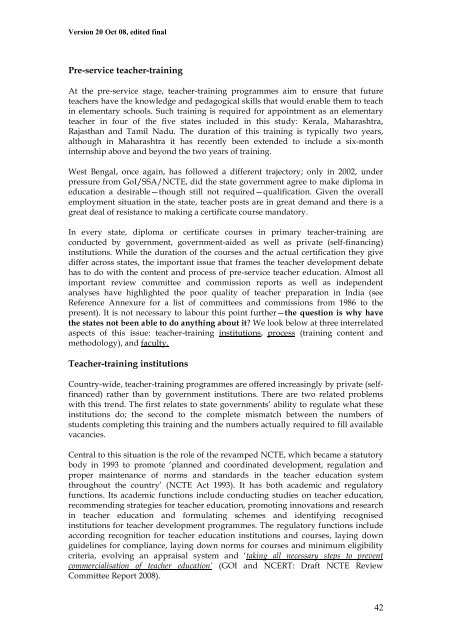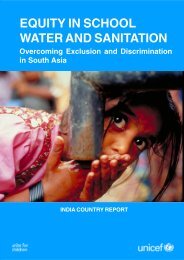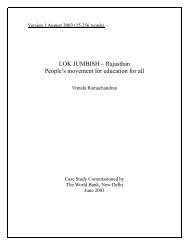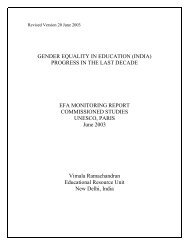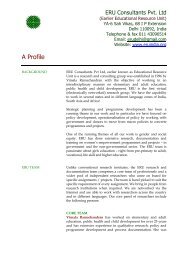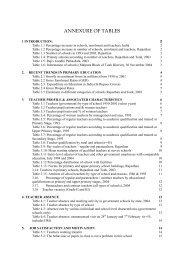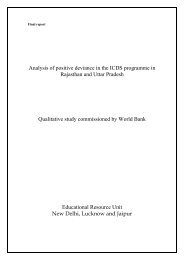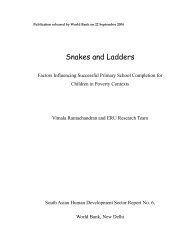primary school teachers the twists and turns of everyday practice
primary school teachers the twists and turns of everyday practice
primary school teachers the twists and turns of everyday practice
Create successful ePaper yourself
Turn your PDF publications into a flip-book with our unique Google optimized e-Paper software.
Version 20 Oct 08, edited final<br />
Pre-service teacher-training<br />
At <strong>the</strong> pre-service stage, teacher-training programmes aim to ensure that future<br />
<strong>teachers</strong> have <strong>the</strong> knowledge <strong>and</strong> pedagogical skills that would enable <strong>the</strong>m to teach<br />
in elementary <strong>school</strong>s. Such training is required for appointment as an elementary<br />
teacher in four <strong>of</strong> <strong>the</strong> five states included in this study: Kerala, Maharashtra,<br />
Rajasthan <strong>and</strong> Tamil Nadu. The duration <strong>of</strong> this training is typically two years,<br />
although in Maharashtra it has recently been extended to include a six-month<br />
internship above <strong>and</strong> beyond <strong>the</strong> two years <strong>of</strong> training.<br />
West Bengal, once again, has followed a different trajectory; only in 2002, under<br />
pressure from GoI/SSA/NCTE, did <strong>the</strong> state government agree to make diploma in<br />
education a desirable—though still not required—qualification. Given <strong>the</strong> overall<br />
employment situation in <strong>the</strong> state, teacher posts are in great dem<strong>and</strong> <strong>and</strong> <strong>the</strong>re is a<br />
great deal <strong>of</strong> resistance to making a certificate course m<strong>and</strong>atory.<br />
In every state, diploma or certificate courses in <strong>primary</strong> teacher-training are<br />
conducted by government, government-aided as well as private (self-financing)<br />
institutions. While <strong>the</strong> duration <strong>of</strong> <strong>the</strong> courses <strong>and</strong> <strong>the</strong> actual certification <strong>the</strong>y give<br />
differ across states, <strong>the</strong> important issue that frames <strong>the</strong> teacher development debate<br />
has to do with <strong>the</strong> content <strong>and</strong> process <strong>of</strong> pre-service teacher education. Almost all<br />
important review committee <strong>and</strong> commission reports as well as independent<br />
analyses have highlighted <strong>the</strong> poor quality <strong>of</strong> teacher preparation in India (see<br />
Reference Annexure for a list <strong>of</strong> committees <strong>and</strong> commissions from 1986 to <strong>the</strong><br />
present). It is not necessary to labour this point fur<strong>the</strong>r—<strong>the</strong> question is why have<br />
<strong>the</strong> states not been able to do anything about it? We look below at three interrelated<br />
aspects <strong>of</strong> this issue: teacher-training institutions, process (training content <strong>and</strong><br />
methodology), <strong>and</strong> faculty.<br />
Teacher-training institutions<br />
Country-wide, teacher-training programmes are <strong>of</strong>fered increasingly by private (selffinanced)<br />
ra<strong>the</strong>r than by government institutions. There are two related problems<br />
with this trend. The first relates to state governments’ ability to regulate what <strong>the</strong>se<br />
institutions do; <strong>the</strong> second to <strong>the</strong> complete mismatch between <strong>the</strong> numbers <strong>of</strong><br />
students completing this training <strong>and</strong> <strong>the</strong> numbers actually required to fill available<br />
vacancies.<br />
Central to this situation is <strong>the</strong> role <strong>of</strong> <strong>the</strong> revamped NCTE, which became a statutory<br />
body in 1993 to promote ‘planned <strong>and</strong> coordinated development, regulation <strong>and</strong><br />
proper maintenance <strong>of</strong> norms <strong>and</strong> st<strong>and</strong>ards in <strong>the</strong> teacher education system<br />
throughout <strong>the</strong> country’ (NCTE Act 1993). It has both academic <strong>and</strong> regulatory<br />
functions. Its academic functions include conducting studies on teacher education,<br />
recommending strategies for teacher education, promoting innovations <strong>and</strong> research<br />
in teacher education <strong>and</strong> formulating schemes <strong>and</strong> identifying recognised<br />
institutions for teacher development programmes. The regulatory functions include<br />
according recognition for teacher education institutions <strong>and</strong> courses, laying down<br />
guidelines for compliance, laying down norms for courses <strong>and</strong> minimum eligibility<br />
criteria, evolving an appraisal system <strong>and</strong> ‘taking all necessary steps to prevent<br />
commercialisation <strong>of</strong> teacher education’ (GOI <strong>and</strong> NCERT: Draft NCTE Review<br />
Committee Report 2008).<br />
42


